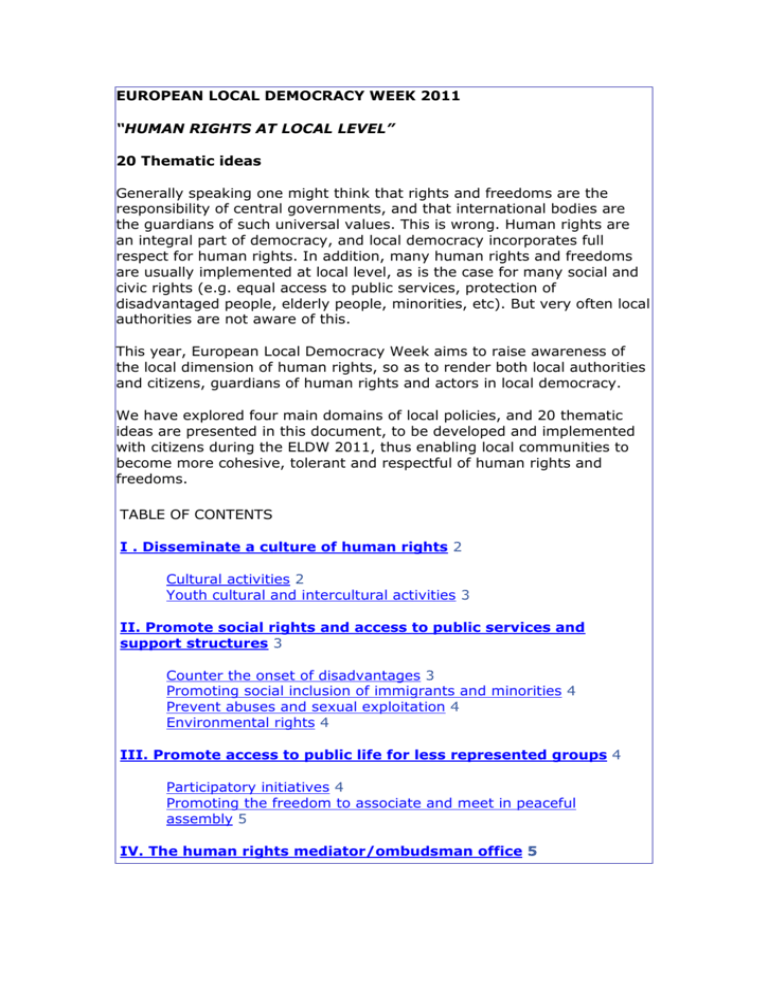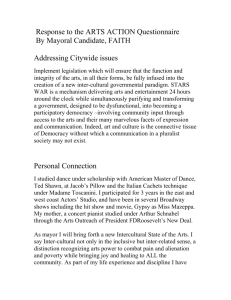EUROPEAN LOCAL DEMOCRACY WEEK 2011
advertisement

EUROPEAN LOCAL DEMOCRACY WEEK 2011 “HUMAN RIGHTS AT LOCAL LEVEL” 20 Thematic ideas Generally speaking one might think that rights and freedoms are the responsibility of central governments, and that international bodies are the guardians of such universal values. This is wrong. Human rights are an integral part of democracy, and local democracy incorporates full respect for human rights. In addition, many human rights and freedoms are usually implemented at local level, as is the case for many social and civic rights (e.g. equal access to public services, protection of disadvantaged people, elderly people, minorities, etc). But very often local authorities are not aware of this. This year, European Local Democracy Week aims to raise awareness of the local dimension of human rights, so as to render both local authorities and citizens, guardians of human rights and actors in local democracy. We have explored four main domains of local policies, and 20 thematic ideas are presented in this document, to be developed and implemented with citizens during the ELDW 2011, thus enabling local communities to become more cohesive, tolerant and respectful of human rights and freedoms. TABLE OF CONTENTS I . Disseminate a culture of human rights 2 Cultural activities 2 Youth cultural and intercultural activities 3 II. Promote social rights and access to public services and support structures 3 Counter the onset of disadvantages 3 Promoting social inclusion of immigrants and minorities 4 Prevent abuses and sexual exploitation 4 Environmental rights 4 III. Promote access to public life for less represented groups 4 Participatory initiatives 4 Promoting the freedom to associate and meet in peaceful assembly 5 IV. The human rights mediator/ombudsman office 5 I . Disseminate a culture of human rights Human rights protection has been a fundamental issue since the atrocities of the Second World War, and in 1948 the United Nations adopted the Universal declaration of Human Rights. In 1953 the Council of Europe adopted the European Convention on Human Rights, which constituted a milestone for enforcing democracy throughout the European continent in the post-war reconstruction and stands as a perennial reference. Fifty years later, in 2000, preparing for its enlargement to the Eastern European countries, the European Union adopted the Charter of Fundamental Rights of the European Union, reaffirming the corpus of freedoms and rights of the earlier European Convention. Raising awareness of the long path travelled by several generations in the name of these values is extremely important for enhancing solidarity, respect and tolerance in our communities. Cultural activities 1. Organise school prizes for essays, articles, paintings and art exhibitions concerning human rights. 2. Organise with universities and other cultural organisations lectures, debates and events focused on the educational and historical dimension of human rights and its new challenges. 3. Dedicate a special section of the municipal official website to the participation of the Municipality in ELDW 2011 identified by its logo and slogan and linking to the ELDW website Human Rights reference texts; 4. Organise European events on the values of human rights inviting experts, European historians, international bodies and organisations defending and promoting human rights. Youth cultural and intercultural activities 5. Organise debates on human rights in Youth Councils, with particular emphasis on respect and non-discrimination towards disabled people, and any prejudice based on religious, linguistic, cultural origins and sexual orientations. 6. Intercultural oriented activities may be organised, in cooperation with schools, youth associations and youth councils. Such activities will be organised by and targeted at young people (from different cultures, ethnic minorities, etc) to be held possibly in recreation centres and libraries, focused on mutual school support activities, sport, music and art training and exhibitions. Such initiatives will encourage cultural interaction and combat segregation and cultural isolation. 7. Other intercultural initiatives may be organised with all citizens (in particular elderly people and women) in different neighbourhoods where residents from different regions and countries will exhibit handcraft products, traditional dishes, traditional costumes, etc., thus improving social cohesion in multicultural neighbourhoods and communities. II. Promote social rights and access to public services and support structures Public and support services are commonly open to all citizens, but disadvantaged people, for different reasons, are far from being fully informed of them. This very often happens to elderly people, people with disabilities, young people in difficulties, families dealing with poverty and immigrants. Financial crisis and sudden unemployment might increase these areas of distress and social exclusion. The following initiatives aim to encounter the citizens where they live, anticipating and preventing the risk of distress. Counter the onset of disadvantages 8. Place info-points, caravans or kiosks in different neighbourhoods, squares and food markets so as to provide citizens and residents with information and leaflets on social, health and assistance services, in particular youth assistance and prevention services, support to families in difficulties, nursery and child assistance, leisure and other activities for elderly people available in the area and in the municipality, access to social housing lists, etc. 9. In areas where many families are affected by jobless and other consequences of the financial crises, a help desk could inform them on the supportive measures undertaken by the different departments of the municipality and by other local and regional institutions which could help to limit the impact of the crisis. Promoting social inclusion of immigrants and minorities 10. Distribute dedicated leaflets in the language of the main foreign communities, including all information on the different services addressing the integration needs of immigrants and their families (address of information desks, immigrant language courses, associations and intercultural mediators, etc). Prevent abuses and sexual exploitation 11. Awareness-raising initiatives and communication campaigns may be organised in various neighbourhoods (in markets and commercial areas), in co-operation with volunteers and associations, especially targeted to women and children, in order to avert any kind of sexual abuses or exploitation, familiar segregation and domestic violence. Environmental rights Providing all residents with human living conditions in a community is crucial to the preservation of security and safety. Environmental protection and remediation of polluted areas guarantees citizens the right to safe and healthy conditions. Drinking water and sanitation are also primary services. 12. Providing camps and caravan areas and other settlements with drinking water, toilets and sanitation services is necessary for the improvement of human living conditions. 13. More generally, during the ELDW, activities could be organised with citizens and volunteers for cleaning areas used as illegal dumps and devote them to public uses. III. Promote access to public life for less represented groups Many activities may meet the challenge of securing equal opportunities to the different target groups of citizens and residents in taking part in public life, avoiding any kind of discrimination. By overcoming cultural resistance or lack of self-confidence, people will be more stimulated to take part in public life. Participatory initiatives 14. Municipalities can organise in the different neighbourhoods a wide range of informal participatory activities inviting all residents and local elected officials to increase their mutual relationships and their trust in the local authorities regardless of age, sex, religion, ethnic origin, disability and status. 15. Open debates, meetings and question & answer sessions with the mayor and councillors can be organised in the different neighbourhoods on issues of interest to them. 16. Visits to the City Hall and meetings with the local officials can also be useful to this end, especially directed at specific target groups who might appreciate and benefit from becoming more familiar with the institutions. 17. Youth Councils could be created in order to make young people familiar with the democratic rules of democracy and involve them in public life. Promoting the freedom to associate and meet in peaceful assembly 18. Targeted permanent actions may be carried out to allow different target groups to meet, pray and organise other cultural activities (e.g. allocating a municipal space/building for the use of migrant and minority associations or for use as a place of worship for religious minorities). During the Week, interreligious and intercultural dialogue activities can be organised. 19. Support activities to non-profit associations and in particular to minority community associations, especially focused on administrative and managerial issues, can be organised during the Week. IV. The human rights mediator/ombudsman office Several European countries have entitled a person to be mediator or civic defender or ombudsman at local and regional level, to whom citizens may submit their claims where they feel their rights have been violated. A mediator or ombudsman office at local level, will promote spirit of legality and self-respect behaviours and consequently it will enhance and diffuse culture for human dignity and rights. 20. On the occasion of European Local Democracy Week, a municipality may decide to vest a person with this responsibility. This may be a retired professor, a judge, a councillor or the Mayor in person. He/she may receive claims, examine them and propose remedies to meet the citizens’ expectations. Specific procedures and measures could be undertaken when the mediator/ombudsman checks that fundamental rights are not fully respected in the delivery of local public services, in order to overcome current problems and bottlenecks.





